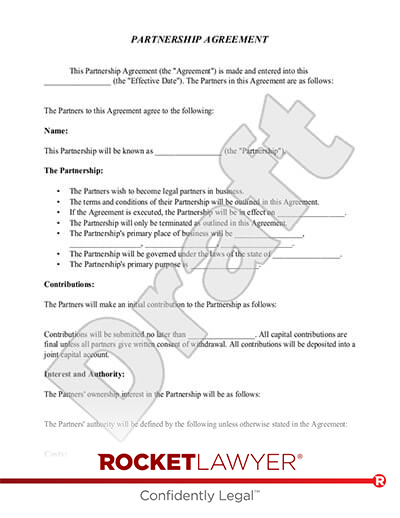Diversifying Your Skills
A partnership is a relationship. You need to be able to communicate well, trust each other and give each other the same respect when working as partners.
Just like you don't want to date yourself, you don't want a business partner who shares all the same skills. Having a wizard at programming when you already are one isn't going to give you an edge.
What skills are you lacking? Find a partner with those skills. Think of the big picture, including financing, marketing and employee relations. Working with partners should work to your advantage.
Signing a Partnership Agreement
A handshake doesn't cut it in the corporate world, no matter how close you are. Get everything in writing.
A business partnership defines the business terms of working with partners. It includes the following:
- Sharing of profits
- Separation of work
- Expected contribution amounts
- Ownership interests
- Buy-out options
We offer free documents to help get your partnership in writing. An LLC operating agreement, if forming a limited liability company, includes wording to spell out each member's financial rights and duties. If not, sign a partnership agreement that includes how decisions will be made, how much each of you are expected to invest and how you share profits.
Don't forget to include a buy-sell agreement. This agreement governs what happens if a partner dies or leaves the business. It avoids financial and tax problems that could result if steps aren't spelled out while working with partners.
Establishing Partner Duties
The more clear you are in the beginning, the more likely your partnership will last. When working with partners, discuss each other's responsibilities. Put into writing who is responsible for what.
Starting a startup sometimes results in friction between business partners. Just like a relationship, you won't always see eye to eye. Split up the work beforehand when working with partners to put everyone's strengths to good use. Make clear who is responsible for doing what by including it in the LLC operating agreement or partnership agreement.
Holding a Business Meeting
Just like a marriage, a good partnership relies on communication. When you don't communicate while working with partners, your business will suffer.
Talk or email each other about the good and bad so no one has any surprises. Set up regular meetings to discuss the business. Meetings are what you make of them. The better they are organized, the more productive they will be.
When setting up a meeting:
- Know what issues you will discuss.
- Decide who should attend.
- Schedule a time and place.
- Create an agenda with any urgent issues first.
Make sure to take minutes of your meeting and distribute them. We offer a corporate minutes document to help make this easy.
Being Flexible
Let's face it: Relationships change, priorities shift, responsibilities grow and demands increase. All have an effect on that relationship. Success takes willing to be flexible.
The same goes when working with partners. Re-evaluate the partnership as you go along to make sure it's fair to all involved. Be willing to shift duties and work with each other so your skill sets continue to benefit the business. Working with partners takes each partner's willingness to change with the times as the business grows.
Having an Exit Strategy
Sometimes things don't work out when working with partners. Do you have a plan in place in case if that happens?
A buy-sell agreement, also called a "business will" or "business prenupt," sets up what happens if a business partner dies or leaves the company. It includes provisions for death, disability, retirement, divorce and transfers of the company.
Chicago-Kent College of Law Clinical Assistant Professor Heather Harper, who launched and directs the college's Entrepreneurial Law Clinic, says to make sure to address what happens if a partner leaves. She says to consider a clause in any agreement where each partner has to be "vested," or put in a certain amount of time or work, before being able to share in the profits.
Harper advises having a vesting agreement that lets the business buy back all or part of a co-founder's unvested shares in the business. This lets the departing partner keep the "earned" equity interest, while remaining partners can buy back the "unearned" shares at either the price they were purchased or at fair market value.
A joint partnership or LLC operating agreement can also include wording to address what happens if a partner leaves.
Working with partners enables you to make sure your startup has the needed skills and expertise to make it work. It takes a willingness to work together and enough forward thinking to guard against conflicts down the road. Remember, our small business legal center offers the needed paperwork to set up agreements and advice on how to set up a partnership. Consult a Legal Pro to get the legal help you need.
This article contains general legal information and does not contain legal advice. Rocket Lawyer is not a law firm or a substitute for an attorney or law firm. The law is complex and changes often. For legal advice, please ask a lawyer.
